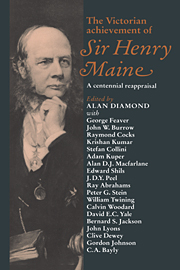Book contents
- Frontmatter
- Contents
- Notes on contributors
- Foreword by Sir John Lyons
- Introduction
- 1 The Victorian values of Sir Henry Maine
- PART 1 MAINE AND THE IDEA OF PROGRESS
- PART 2 MAINE AND THE SOCIAL SCIENCES
- PART 3 MAINE ON LAW, LEGAL CHANGE AND LEGAL EDUCATION
- 11 Maine and legal education
- 12 Maine and legal education: a comment
- 13 A wake (or awakening?) for historical jurisprudence
- 14 Further thoughts on Maine's historical jurisprudence
- 15 Fictions, equity and legislation: Maine's three agencies of legal change
- 16 Law and language: a metaphor in Maine, a model for his successors?
- 17 Linguistics and law: the legacy of Sir Henry Maine
- PART 4 MAINE AND INDIA
- Appendix: the conference programme
- Bibliography
- Index
11 - Maine and legal education
Published online by Cambridge University Press: 04 September 2009
- Frontmatter
- Contents
- Notes on contributors
- Foreword by Sir John Lyons
- Introduction
- 1 The Victorian values of Sir Henry Maine
- PART 1 MAINE AND THE IDEA OF PROGRESS
- PART 2 MAINE AND THE SOCIAL SCIENCES
- PART 3 MAINE ON LAW, LEGAL CHANGE AND LEGAL EDUCATION
- 11 Maine and legal education
- 12 Maine and legal education: a comment
- 13 A wake (or awakening?) for historical jurisprudence
- 14 Further thoughts on Maine's historical jurisprudence
- 15 Fictions, equity and legislation: Maine's three agencies of legal change
- 16 Law and language: a metaphor in Maine, a model for his successors?
- 17 Linguistics and law: the legacy of Sir Henry Maine
- PART 4 MAINE AND INDIA
- Appendix: the conference programme
- Bibliography
- Index
Summary
The thesis that I wish to put forward is that many of Maine's basic ideas about law were closely linked to the particular needs of legal education in England in the 1850s, as he perceived them. That was the period when Maine was giving the lectures which became the basis of Ancient Law, and his perception of what students of law should be taught coloured what he included in his lectures. So our first concern is with the state of legal education at that time.
The great movement for the reform of English law, which began in the 1830s, had lost none of its momentum in the 1840s. It was a movement largely inspired by the ideas of Jeremy Bentham, and it aimed to make the law simpler and more rational, by eliminating antiquarian relics which had served their purpose and could no longer be justified. In a general way it may be said that the reforms that were proposed aimed to make English law more scientific than it had been. As long as the law is perceived as essentially a matter of custom and practice, it follows that the proper way to learn the law is to attach oneself to a practitioner and watch what he does with the aim of following his example. Once law is seen as in some sense a science, the method of learning by watching and copying appears to be manifestly inadequate, and some kind of systematic instruction is required.
- Type
- Chapter
- Information
- The Victorian Achievement of Sir Henry MaineA Centennial Reappraisal, pp. 195 - 208Publisher: Cambridge University PressPrint publication year: 1991



